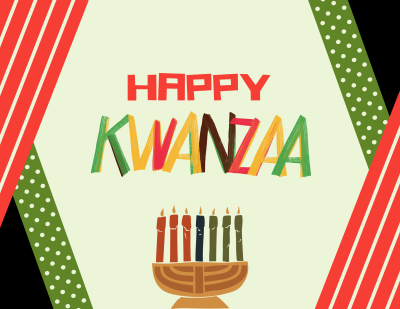
Kwanzaa was first created in 1966 by Dr. Maulana Karenga, professor and chairman of Black Studies at California State University, who sought to unite African Americans as a community in the face of race riots. The holiday is a celebration of African ancestry and draws inspiration from African harvest celebrations. Kwanzaa takes place from December 26th to January 1st every year.
Kwanzaa is filled with important symbolism. Each day is dedicated to one of seven important principles:
- Unity (umoja)
- Self-determination (kujichagulia)
- Collective responsibility (ujima)
- Cooperative economics (ujamaa)
- Purpose (nia)
- Creativity (kuumba)
- Faith (imani)
There also are seven symbols of Kwanzaa:
- Fruits, vegetables, and nuts
- A straw mat
- A candleholder (kinara)
- Ears of corn (maize)
- Gifts
- A communal cup signifying unity
- Seven candles in the African colors of red, green and black, symbolizing the seven principles.
Each day the family comes together to light a candle on the kinara and discuss the principle being recognized that day. Some celebrants wear traditional African clothing. Other traditions include a daily Karamu feast with foods from the African diaspora; expressing artistic creativity through dance, poetry and drumming, and giving gifts with cultural value to children to teach them about their African heritage.
You can check out a pre-Kwanzaa celebration at City Hall on YouTube, and you can check out Kwanzaa books from the Yonkers Public Library here.
Alison Robles is a Part-Time Junior Clerk at the Crestwood Library. She is an avid reader with a passion for YA lit, historical fiction and fantasy. A Yonkers native, she graduated from Iona University in 2020 with a dual-degree in Marketing and Public Relations. She is pursuing an MS in Information and Library Science from the University at Buffalo.